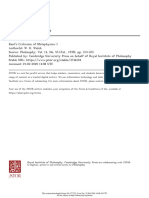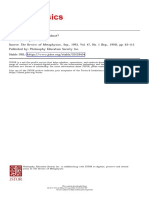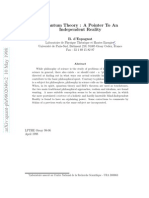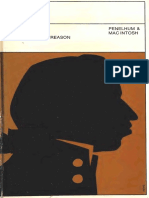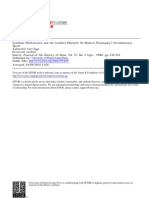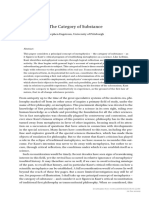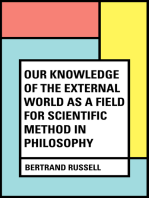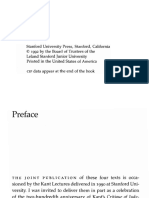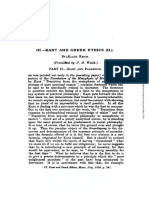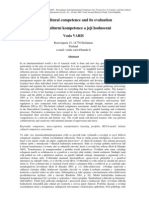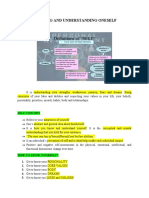Professional Documents
Culture Documents
Ameriks CommonsenseKant 2005
Ameriks CommonsenseKant 2005
Uploaded by
Lamár ErzsébetOriginal Description:
Original Title
Copyright
Available Formats
Share this document
Did you find this document useful?
Is this content inappropriate?
Report this DocumentCopyright:
Available Formats
Ameriks CommonsenseKant 2005
Ameriks CommonsenseKant 2005
Uploaded by
Lamár ErzsébetCopyright:
Available Formats
A Commonsense Kant?
Author(s): Karl Ameriks
Source: Proceedings and Addresses of the American Philosophical Association , Nov.,
2005, Vol. 79, No. 2 (Nov., 2005), pp. 19-45
Published by: American Philosophical Association
Stable URL: http://www.jstor.com/stable/30046212
JSTOR is a not-for-profit service that helps scholars, researchers, and students discover, use, and build upon a wide
range of content in a trusted digital archive. We use information technology and tools to increase productivity and
facilitate new forms of scholarship. For more information about JSTOR, please contact support@jstor.org.
Your use of the JSTOR archive indicates your acceptance of the Terms & Conditions of Use, available at
https://about.jstor.org/terms
American Philosophical Association is collaborating with JSTOR to digitize, preserve and extend
access to Proceedings and Addresses of the American Philosophical Association
This content downloaded from
217.65.125.171 on Sun, 25 Jun 2023 09:57:32 +00:00
All use subject to https://about.jstor.org/terms
A COMMONSENSE KANT?
KARL AMERIKS
UNIVERSITY OF NOTRE DAME
I begin from an admittedly unusual perspective. Whatever Kant's system is
in itself, it is likely that most philosophers believe the last thing it can be
helpfully linked with is common sense in general and the philosophy of
Thomas Reid in particular.' From the perspective of my interpretation,
however, the intriguing issue here is not whether Kant's thought is in
fundamental ways like common sense and the viable core of Reid's
philosophy, but rather why so many fine minds still think otherwise.
I. A Different Kind of Turn
The basic systematic similarities that I will be stressing include the very
features of metaphysical realism and epistemological anti-Cartesianism that
have led many contemporary philosophers to think that we obviously should
look to Reid rather than Kant as a philosophical "soul mate."2 The standard
attitude toward this choice will need to be reconsidered if it can be shown
that these similarities obtain, and that the overall strategy of the Critical
philosophy involves an effective apologist methodology remarkably similar
to what is best in Reid's commonsense approach.
Although I will focus on epistemological arguments in the theoretical
philosophy at the core of Kant's system, I believe this reading would only be
strengthened if there were a chance to consider these arguments in more
detail in the context of his entire system.3 In its ethics and aesthetics, the
Critical system begins from presumptions that parallel the commonsense
starting points of the first Critique, as well as similar claims in Reid's
multifaceted system.4 I will argue that the mystery of how these similarities
could have been so often overlooked can be explained largely by the failure
of many interpreters to appreciate the crucial "regressive" and multilevel
structure of Kant's system. I will also draw attention to the highly relevant
historical fact that a commonsense approach to Kant's system had
considerable popularity at the time of the initial reception of his work.5
Faced with the notorious difficulty of Kant's texts, readers naturally
gravitate toward assimilating the Critical system to those models of
philosophy with which they are most familiar. This has often meant trying to
understand Kant's work in terms of the so-called Cartesian tradition of the
"way of ideas." Instead of working through exhausting details concerning
"transcendental deductions," "transcendental idealism," and metaphysical
"postulates," one focuses instead on the notion of a shift to a basically
"anthropological"6 perspective that promises a new way to defeat the old
challenge of radical modern skepticism. Supposedly, Kant's main point is
that matters such as the external world and the moral law are demonstrably
This content downloaded from
217.65.125.171 on Sun, 25 Jun 2023 09:57:32 +00:00
All use subject to https://about.jstor.org/terms
20 Proceedings and Addresses of the APA, 79:2
knowable through an introspective turn to our own ideas after
because we construct them out of concepts that we ourselves
Surely many non-specialists would feel lost if Kant cannot
this way, that is, as simply trying to tie inner representations tog
more tightly, from the inside out, with a new Prussian superg
may seem literally too good to be true but at least does not hav
defects of Berkeley's spiritualist contentions or of Humea
resignation. When this transcendental "glue" is discussed
specialists, the tendency is to explain it as part of a system withou
metaphysical implications. On this popular and "anodyne" rea
project is basically to limn the contours of our empirical
framework." Insofar as he meaningfully discusses metaphysics
sense, this is merely to reveal the illusions of its systems, or
explain how his philosophy provides an especially appropriate
Newtonian science. If texts that suggest more than this are a
at all, they are dismissed as showing that sometimes even Kan
his position in terms that are riddled with "patent nonsense"
"piling metaphysical monstrosity upon metaphysical monstro
"extravagant" way, clearly "at odds with common sense."' An
one of the most knowledgeable of Kant experts says. No won
analytic philosophers not overly concerned with exegesis of the
Akademieausgabe don't hesitate to call (what they take to be) Kant's views
"perplexing," "preposterous," and "bordering on madness."8
My interpretation, in contrast, proposes an ineliminable and coherent
place for the metaphysical dimension of Kant's system within its basic four-
level structure. These four levels are: (1) a starting point in experience, which
is defined in terms of the ordinary claims of everyday knowledge,9 (2) a
development in terms of "transcendental" arguments that "regressively"
establish pure concepts and principles as necessary for the knowledge that
has been presupposed, (3) a metaphysical interpretation of the contents of
the whole sphere of our determinate theoretical knowledge as
"transcendentally ideal," and, finally, (4) a culmination of the system as a
whole in a satisfaction of its founding concerns through a rational, albeit
"practical," defense of the postulates of freedom, God, and the possibility of
immortality. (I present these four levels primarily with the structure of the
first Critique in mind, but parallel points apply to the structure of Kant's
ethics and aesthetics.)
Kant's main motive for the third level of his system, his theoretical
arguments for transcendental idealism, is surely to defend what he takes to
be the only reasonable way to exclude, as not possible, the main obstacle to
his fourth-level beliefs and their key libertarian doctrine. This obstacle is any
form of transcendental realism that takes the thoroughly determined
spatiotemporal features described at the second level to be ultimate, to
exhaust the realm of all that concretely exists.'" Making sense of Kant's motive
alone therefore requires, I believe, a metaphysical interpretation of the
content of transcendental idealism and a reading that focuses specifically
on the doctrine of the ideality of space and time. No "short argument" that
would conclude to idealism from entirely general considerations about
minds, concepts, synthesis, and so on can begin to do justice to the basic
arguments and conclusions actually present in the Critique.
This content downloaded from
217.65.125.171 on Sun, 25 Jun 2023 09:57:32 +00:00
All use subject to https://about.jstor.org/terms
Presidential Address - Central Division 21
I turn now, in a second section, to showing how
points, and especially the distinction between the first t
system, are relevant for understanding mistakes commo
to contrast Reid and Kant. In a third section, I begi
connection between Reid and Kant by clarifying sig
similarities between them, most of which concern c
of their epistemology of perception. In a fourth and
address metaphysical issues that also link their phil
II. False Differences
The locus classicus for those who sharply contrast Kant and Reid is a passa
from the Prolegomena:
To appeal to common sense when insight and science fail, and no
sooner-this is one of the subtile discoveries of modern times, by
means of which the most superficial ranter can safely enter the lists
with the most thorough thinker and hold his own. ...Seen clearly, it
is but an appeal to the opinion of the multitude, of whose applause
the philosopher is ashamed, while the popular charlatan boasts of
it.11
Because Kant made these remarks in discussing "opponents of the
great thinker" Hume, and he singled out "Reid, Oswald, Beattie, and lastly
Priestley," it is understandable that this text has been taken to signal that the
Critical system excludes any appeal to common sense and any positive
relation to Reid's philosophy. However, as Manfred Kuehn demonstrated
some time ago, we now know that the context of the Prolegomena reveals
that Kant, in large part, intended this passage not as a rejection of Reid as
such but as a criticism of the Popularphilosophen in Germany at the time.
Kant's main concern was to distance himself from what he took to be their
very influential and crude appeals "to the opinion of the multitude" under
the heading of employing common sense as a tool for rejecting systematic
philosophy altogether.12 These appeals directly threatened his Critique, and
they appeared to Kant to lie behind the negative reviews of the first edition
that the Prolegomena was hastily written to counter. Kant also had general
reasons for being worried: the supporters of commonsense philosophy
that he was most familiar with had been linked with anti-academic
movements and, indirectly, with fanatical trends that were of urgent
in his own country.
From a systematic perspective, however, there are many reas
saying Kant's system is clearly indebted to common sense, and h
immediate followers stressed this point repeatedly. As a famous
autobiographical note from 1764 reveals, the main inspiration for Kant's
mature work was the "leveling" effect of reading Rousseau, who taught him
that it is not lofty speculation but rather insights into rational morality shared
by the "common laborer" that define the main interest of philosophy.1 Kant
turned the three basic articles of the simple "Savoyard vicar's" creed into
the three postulates of pure practical reason-God, freedom, and the
possibility of immortality-that his first Critique was designed to make
rationally defensible.'4 Instead of tying the basis of these postulates directly
to intuition or common sense, however, Kant went on to distinguish between
the first-level fact of "moral experience" as such (i.e., a common but rational
This content downloaded from
217.65.125.171 on Sun, 25 Jun 2023 09:57:32 +00:00
All use subject to https://about.jstor.org/terms
22 Proceedings and Addresses of the APA, 79:2
sense of duty), the second-level philosophical formulation and
its general principles, and the higher-level metaphysical consid
specific postulates that fill out the proper conditions of the mo
Kant's main expositor, Karl Reinhold, then made the Critica
a belated but enormous success in Germany by emphasizing t
and their relation to current controversies, in his Letters on
Philosophy, 1786-87. This remarkable bestseller does not actual
explain Kant's philosophical project in terms of the details of
"grounds" in the Transcendental Aesthetic and Transcendenta
Instead, it argues vividly that the core "results" of both "the
Christianity" and the Critique's "Gospel of pure reason" are n
than the most appropriate responses of reason to the deepest m
of common sense in light of the historical situations in which thes
were introduced.'6 Kant whole-heartedly endorsed Reinhold's
work, not foreseeing that once Reinhold obtained his own pr
and immense following in Jena, he would eventually turn hi
directions leading to the development of German Idealism an
pointing away from common sense and the Critical system.17
Reinhold was not the only one of Kant's early readers to lin
sense and Critical philosophy. When Friedrich Niethammer f
new leading journal of Jena in 1795, its first article was enti
Demands of Common Sense to Philosophy."'8 In this article and
forward, Niethammer closely links the "scientific" (i.e., systematic
of Critical philosophy with the goal of properly "making philosoph
by serving the "final purpose of humanity," after bringi
"determination of concepts" to "common human unders
common sense]."'9 Niethammer appropriately characterizes
called the "first-level" of Kant's system by saying "that there is ex
all is a general fact that [proper] philosophy presuppose
understands this not so much as an explicit belief but as a grou
taken for granted.21 It is for this reason that he says, "what does
philosophical proof, also is not to be doubted in philosophy."22
commonsense realism provides a proper limiting condition on
claims, but he adds that common sense alone is not in a posit
higher-level disputes about universal and necessary claims such
principle of causality or a nonempirical kind of freedom. Simi
can be found in the ideas of the Jena circle of "early Kant
Friedrich von Herbert and Johann Benjamin Erhard, and the
became a major factor in philosophical strands of early roma
movement strove mightily, but vainly, to save Kant's own pers
being swamped by the ambitious foundationalist project
Idealism.23
It is precisely this distinction between the first two level
system--ordinary experience and pure principles-that is crucia
understanding his reaction to common sense in the passage q
from the Prolegomena. Kant is not arguing there against comm
such, but only against those who appeal to it when "science"
sooner." As he immediately goes on to explain in the next parag
nothing at all wrong with heeding the bounds of "healthy com
as a starting point. Problems arise only if one supposes that th
This content downloaded from
217.65.125.171 on Sun, 25 Jun 2023 09:57:32 +00:00
All use subject to https://about.jstor.org/terms
Presidential Address - Central Division 23
all our thought, common experience, can by itself substi
step, the transcendental step of exploring pure concept
they provide us with demonstrable general principles f
whether they yield proofs or contradictions when we t
determinately beyond our experience.25 In other words,
is not designed for questions or answers in regard to r
about whether there is experience of objects at all.26 K
vindicate our healthy common sense by arguing that the
require a more systematic structure than it itself can explai
ideally fits modern science and our pure practical goals a
is not to overturn common sense as such, but merely t
quick and crude appeal to it alone to settle especially dif
questions such as the existence of empirical necessity
freedom.
Reid admittedly does not pause, in the specific way that Kant does, over
the distinctions made here between the basic levels of philosophy, and so
there remains a difference between them-hence the question mark in my
title-but not a difference of the radical kind that has generally been
supposed. There remain many important issues concerning which Reid and
Kant can agree.
III. Genuine Similarities
There are at least ten kinds of basic similarities between Reid and Kant that
deserve clarification in this context. They fall into three groups: the first three
directly concern philosophical methodology and the notion of common sense
in general, the next six have to do primarily with the theory of perception,
and the final one introduces a batch of metaphysical issues raised especially
by Kant's doctrine of the ideality of self-knowledge.
The first of these similarities consists in the broadly rationalist orientation
of Reid and Kant, an orientation that also distinguishes their characterization
of common sense. They both take common sense to be best understood as
not a separate and "oracular" or majoritarian faculty but rather a ground-
level manifestation of ordinary human capacities of thought-and in
particular of judgment and reason-which allow us to obtain substantive
truths that go beyond mere sensation.28 In treating these intellectual
capacities as basic rather than derivative, Reid departs from the empiricist
mainstream of British philosophy, and he picks up on the broadly linguistic
rather than sensationist connotations of the English term "sense." Somewhat
similarly, Kant and his immediate followers such as Reinhold pick up on the
stress on intellect contained explicitly in the German term for common
sense.29 Because that term, gemeiner Menschenverstand, literally means
"common human understanding," it can help avoid the suggestion of mere
particularity and contingency that can immediately arise with the term
"sense."30 Moreover, Kant's special focus on judgment and reason, especially
when discussing the "sound" common sense (gesunder Verstand, or
gesunder Menschenverstand) that is his own prime concern, sharply
distinguishes his work from the radically anti-systematic tendencies of
Popularphilosophen such as Johann Georg Feder and Christoph Meiners.31
This underlying rationalism can be missed if one considers only the
limitations that Reid sees in reason when it is understood speculatively as a
This content downloaded from
217.65.125.171 on Sun, 25 Jun 2023 09:57:32 +00:00
All use subject to https://about.jstor.org/terms
24 Proceedings and Addresses of the APA, 79:2
mere faculty for "reasoning," that is, for making formal deductiv
inferences.32 Analogously, Kant's underlying rationalism can
one considers only the limitations he sees in reason when it i
merely speculatively, especially in a material mode as a faculty
determinate theoretical claims altogether beyond experience.
thus reveal a second methodological similarity: a balance of rati
criticism. Reid and Kant both attack what they take to be the
speculative and esoteric claims of most traditional philosophy
the metaphysics of the schools and the earlier moderns. In this
they both remain defenders of reason in a broad sense, they
dogmatic33 in not letting any system ride roughshod over the
common sense-especially by means of abstract arguments
on the reflective reason of a supposedly privileged and en
philosophical standpoint. It is therefore no accident that the very
of significant Kantians-Reinhold, Niethammer, and Erhard
themselves initially from later idealists by writing works th
philosophical significance of common sense for precisely
"populist" reason.34 In arguing explicitly that consistency wi
commitments of common sense is a "criterion" that any proper
claim should respect,35 they are expressing, in their own way
idea that a "burden of proof" falls on those who would re
sense.36 As for Kant himself, his main point is perhaps best e
lecture concerning "philosophical encyclopedia," which says t
Critical philosophy disputes is merely the extreme position tha
is already contained in common sense."37 Similarly, Reid clear
his own philosophical work is by no means a mere "sum" of wh
in common sense, for it must add numerous details that can b
only from the distinctive perspective of systematic thought.38
Third, although both Reid and Kant deeply appreciate
supplement common sense with higher order philosophical in
they are also clear that these investigations should not be un
intended to be a direct "justification" of common sense as
attempted justification here is not only unneeded but als
Moreover, because philosophy always requires some starting p
as far as Reid and Kant can see, these are ultimately the core ju
commitments of common sense-denying these starting point
not simply false but absurd, because common sense maintains
effect on us.40 The initial use of common sense by both Reid
often simply a matter of taking advantage, from the start, of
there are various vaguely defined but definitely objective
perceptual, mathematical, logical, moral, aesthetic-that guide
we take up philosophy. Reid's words mirror Niethammer's: "o
try to prove what is not known by proof."41 What is crucial h
much what is believed, in the sense of entertained or formula
is "taken for granted" by each of us (to use some terms fr
Wolterstorff's very helpful quasi-Wittgensteinian discussion)
propose a concise list of so-called general "principles" of com
but this can obscure his main insight. This insight concerns th
of our concrete everyday presumptions, presumptions that in
explicit beliefs, let alone philosophical reflections about their
This content downloaded from
217.65.125.171 on Sun, 25 Jun 2023 09:57:32 +00:00
All use subject to https://about.jstor.org/terms
Presidential Address - Central Division 25
Kant is somewhat more cautious and, perhaps intention
In his moral and aesthetic writings, he gives only a few rem
supposes we take for granted and as going almost w
example, that some actions are genuinely obligatory
beautiful.43 In his theoretical work, he presumes all along th
start by discussing ordinary things, such as houses and
taken to be not mere representations but objects of "ex
sense of proper empirical judgment.44 He also remarks,
that we all share fundamentally the same space, hence
same mindedness as other humans, and he presumes we
"determine" our consciousness in some objective manne
notions are literally so "taken for granted," and Kant is
use of them, that it is no wonder that many reader
obsessed with radical skepticism, have overlooked wh
doing at the first level of his system. And precisely be
difficult to identify and characterize our "core judgmen
granted," it is understandable that Kant would want, at
organize their implications in categorial order. Whatever
details of his second-level arguments, it is striking how
his first level is consistent with all four notions that recent
taken to be central to Reid's position, namely that a) cor
are not held for "reasons," b) denying them is absurd,
cannot avoid taking them for granted, and d) this is a matte
contingent epistemic nature.46
These methodological points all go hand in hand with a
between Reid and Kant, which concerns the first and m
their account of perception. This is their revolutionary
modern way of ideas and its whole approach to the prob
world.47 This rejection involves two basic steps: an argumen
perceptual knowledge of the external world is not to be e
as an inference from data, and a claim that it is especially n
as arising from knowledge claims about mere inner dat
denies that such an inference could be legitimate or expl
"Cartesian" premise of a starting point in immediate inn
granted.48 But he also denies that we in fact ever have this
knowledge, and he asserts that what we immediately kn
as common sense presumes, the ordinary outer obj
perception.49
Although Neo-Reidians and others still suggest t
epistemological "anti-Cartesianism" is the very opposite of K
in fact central to the Critical theory of perception as well, e
and B versions of what is called the "Refutation of Idealism.
Kant already stresses the inadequacy of any "infer
representations to outer objects.51 In the B edition, Kan
and explicitly stresses that we have what he calls an "im
of objects in space.52 By this he does not mean that we la
are mystically fused with what is outside.53 He means th
outer objects is not gained in a mediate manner by first
merely of the inner as such.
This content downloaded from
217.65.125.171 on Sun, 25 Jun 2023 09:57:32 +00:00
All use subject to https://about.jstor.org/terms
26 Proceedings and Addresses of the APA, 79:2
Like Reid, Kant also claims that determinate knowledge of a
inner kind is not even available for us because our immediate m
itself alone is simply a flux of sensations. This point is consistent w
the existence of intentional acts within us that are successfully
outer world, and also with the possibility of higher-level states
reflect back on ourselves as subjects and determine ourselves
beings in light of what we know about the world at large
knowledge of what is outer is needed, according to the pr
Refutation, precisely not for bare "consciousness" of one's own
but rather for the "determination" of ourselves.54 The Refutation'
not a claim advanced as internal to the way of ideas but
commonsense presumption that Kant is using precisely to "tur
He is showing how his philosophy, unlike "psychological ideal
external resources to explain determinate knowledge of the p
realm itself. This point is missed by later commonsense philo
as Moore, who claim to be presenting an alternative to what the
call Kant's "request for a proof that the external world exists."
to Moore: "They would say 'If you cannot prove your premise
one hand, and here is another, then you do not know it.' This v
cannot prove such things as these, I do not know them, is I th
which Kant was expressing."56 Here Moore is improperly pro
diagnosis of earlier modern philosophers onto Kant, and pres
Kant also must have been a doomed anti-skeptic, starting wit
ideas and a dogmatic refusal to allow any truths not based on
Fifth, in their positive phenomenology of perception, both
insist that while perception always involves sensation and imag
we normally attend to and intend58 are not these component
rather the outer items that we "objectivate" in taking up what
"suggestions" of the sensory.59 This point may seem to some
clearer in Reid than Kant, but, in fact, as the German philos
Prauss demonstrated in detail decades ago, Kant also relies exp
heavily on a model of perceptual experience in which we c
external objects in the process of making an original "reading
upon the occasion of sensation.60 That is, we precisely do not i
inner given but rather interpret nature through it, just as we und
sense of words through the general capacities and particular
have, while not focusing on them, or on individual letters, as
Reid and Kant thus rely on an analogy (but only an analogy)
linguistic understanding of propositions (through signs), in a
comprehension of determinate sense, and our perceptual u
of the world (through signs) in arriving at interpretive b
determinate objects.62
In addition to using this positive account of perception, Reid su
his response to external world skepticism with considerations
depend specifically on the rejection of the way of ideas.63 This six
concerns the pluralistic nature of Reid's epistemology,4 the fact th
a variety of sources of knowledge. Reid insists that the findings of
and memory in particular should not be globally mistrust
dismissed in favor of the Cartesian source of mere "inner consciousness" in
the form of immediate states of feeling or introspective reasoning. This is the
This content downloaded from
217.65.125.171 on Sun, 25 Jun 2023 09:57:32 +00:00
All use subject to https://about.jstor.org/terms
Presidential Address - Central Division 27
broader positive point behind his criticism of mod
enslavement to what he calls "the principle of consciousn
the remarkable thing about Kant is that he agrees with a
though his critics have tended to believe otherwise. Thei
arisen from confusions concerning Kant's emphasis on
of the terms "consciousness" and "apperception." Contrar
of English philosophy,66 these terms are generally used
signify not mere representation, awareness, or immediat
judgmental states that have a determinate object, an ob
on to argue always requires, in our case, a spatial refer
that Kant is an advocate of the "principle of consciousne
attacks on Cartesianism that are central to the extensive elaborations on the
derivative status of self-knowledge in the Critique's Paralogisms and i
numerous additions throughout the second edition.68
A seventh and very closely related point concerns the act character of
our original perceptual beliefs. As Reid stresses, perception is a matter of the
proper exercise of appropriately focused "intellectual powers," and it is not
an entirely receptive process wherein we simply undergo input and a
sequence of associations.69 The charge has often been made that Kant'
account lacks this characterization of perception as something that is
genuine act, albeit not literally an action or exercise of our practical power
The temptation to make this charge-and to miss again an underlying
similarity with Reid-can be explained as resting on a conflation of Kant's
distinct notions of sensation and perception, and perhaps also on an
exaggeration of his famous contrast of intuitions and concepts.70 Although
Kant treats sensations and primitive feelings as receptive and non-cognitiv
events, the very first page of the Critique distinguishes these kinds of wholly
passive facts from the cognitive acts of intuition and perception.71 Kant does,
however, regard perception as relatively receptive in contrast to the highe
processes of merely conceptual activity, and he also, simply in a shorthand
way, globally contrasts the receptivity of sensibility with the spontaneity o
the understanding or will as such. This may have kept some readers from
seeing how for Kant "even" our sensory perception72 is still an intentional
act; it is judgmental and cognitive and not a "brute" and indeterminate given.
Kant's explicit use of the language of intentionality has an advantage
over speaking, as some neo-Reidians do, of our perceptual beliefs as being
"evoked." This kind of talk can obscure the high degree of
underdetermination within perceptual judgment, and hence its ineliminable
element of interpretation.73 The language of evocation rather than intention
and interpretation may have arisen because of misplaced worries about
threats to perceptual realism. The worries are misplaced because our
immediate relation to objects can still be a matter of knowledge even when
it involves interpretations that are something other than simple "evokings"
automatically determined in just one way. Without having to lapse into
antirealism, let alone any kind of whimsical deconstructivism, we can allow
that the process of interpretation in ordinary perception, which "takes" the
world in one of a large number of possible ways, can still disclose how
things are objectively.
This content downloaded from
217.65.125.171 on Sun, 25 Jun 2023 09:57:32 +00:00
All use subject to https://about.jstor.org/terms
28 Proceedings and Addresses of the APA, 79:2
The feature of intentional objectification in perception is cl
to an eighth similarity. Scholars often note that for Reid,
philosophers now, the term "perception" is not treated as a "suc
That is, Reid uses the term "perception" to indicate an objectiva
process, one that culminates in an appropriate and well-structu
always true belief. Thus we can still have what Reid calls "perc
when we are undergoing an hallucination.7" This way of speak
be standard in current philosophical English, but we can e
understand what Reid means, and those who cannot tolerate a
such as "false perception" can simply switch to language abou
but non-veridical perceptual beliefs. It is striking in this con
German term for "perception," namely Wahrnehmung, conta
signifying "truth" right within it, and yet it also is understan
contexts that can be non-veridical. Something similar holds fo
main terms of the Critique, namely Erfahrung, which Kant a
uses for sensory experience that is meant to be true but that,
term "perception" on Reid's usage, can in fact be false. More
Erfahrung signifies not mere sensation or representation, whic
too crude to be even possibly true or false, but rather an objectivel
perceptual claim to empirical knowledge,76 a claim taken to be
defeater arises. It should not be surprising, then, that the
"presumption" of truth," and a "propensity to speak truth" (wh
in the "literal" meaning of the term, Wahrnehmung, which is "
even though success is not guaranteed, is also shared by Reid an
with Reid, this reconstruction involves some admittedly jarrin
but those who cannot tolerate expressions in the Critique s
knowledge"78 can simply switch to talking about knowledge
turn out to be unsuccessful.
A ninth similarity between Reid and Kant concerns a variety of feature
that can be listed under the common heading of "anti-sensationism."
striking example here is the relatively oft-noted anticipation by Reid of Kant's
notion that we are acquainted with pure space in a way that is independen
of all particular sensations.79 Reid and Kant also share a concession to Hum
in accepting that notions such as self, causality, necessity,80 and morality are
not based in sensation. Even more significantly, they share an objection to
Hume in saying that these notions can nonetheless be legitimately used in
pure way without endorsing the typical transcendent inferences of traditional
metaphysics.
Another basic difference, closely linked to many of these points, is tha
both Reid and Kant tend to focus their philosophy on "complete" syntacti
formations, such as propositions and judgments,81 rather than mere terms
concepts, or ideas, let alone sensations, which were the prime focus o
much of earlier modern philosophy. This point is also related to a significan
similarity in how Kant and Reid discuss the origin of philosophical concept
Just as Reid holds that our use of the concept of a faculty is not derived b
typical empiricist abstraction but is "evoked" upon the experience of the
operation of a faculty, so Kant argues, already in his Dissertation, that th
origin of our use of fundamental concepts is not to be explained by innateness
or a comparison of sensations but by a distinctive awareness that arises i
their being exercised.82 Kant is also committed to the view that neither th
This content downloaded from
217.65.125.171 on Sun, 25 Jun 2023 09:57:32 +00:00
All use subject to https://about.jstor.org/terms
Presidential Address - Central Division 29
grasp of a concept nor its justified use can be explained in gen
causation, for he stresses that such an explanation is clear
the categories.83
I turn now to the tenth similarity, the basic metaphysical
Reid's and Kant's views. The appropriate topic to begin w
knowledge because it connects directly with the earlier d
Refutation of Idealism, and it immediately presents wha
most perplexing aspect of Kant's idealism. Kant's idealist a
provocative that friends and foes alike have raised two d
kinds of claims about it. Some say that Kant so radically p
that, because of a supposed foundation of the Critica
"principle of consciousness,"84 he makes it in some sense
not only, thing that exists (or at least is all that we can know
the opposite, that Kant denies all genuine self-knowledg
all our knowledge, and thus even the self, into a mere con
ontological status is nothing more than a fiction.85 In
suspicious-sounding idealism of the Critical philosophy
contrasting with the view of figures such as Reid, who cle
knowledge of the self through common sense, despite his crit
aspects of Cartesianism.
So it may seem, but here again the complexity of Kant's th
unfortunate influence of various unnecessary presumpti
interpreters from recognizing a significant overlap of sou
and the core of Kant's account of the self as such. The b
Kant's Paralogisms and Refutation of Idealism shows that w
criticizes are simply the radically Cartesian and dogm
arguments about the self that now disturb most philoso
emphasize the phenomenon of apperception, but his two
contrast with earlier foundationalist views rather than w
Reid and Reid's heirs.
Kant's first point is that the judgmental nature of apperception is needed
for knowledge as such, and, hence, that even determinate self-knowledge,
as opposed to mere acquaintance, cannot arise--either with a phenomenal
or a more than phenomenal status-from mere passive exposure to inner
sense, or from some kind of primitive and active inner pointing."8 Second,
Kant stresses that human self-knowledge requires apperception to be
combined with sensory data, so that the mere form of apperception itself,
i.e., the operator, "I, or he, or it that thinks..." is also not enough by itself to
generate even self-knowledge-either with a phenomenal or more than
phenomenal status. More positively, insofar as we can have determinate
self-knowledge, and not merely an indeterminate sense that there is some
subject indubitably aware of "being,'"87 our conceptual/apperceptive and
receptive/sensory faculties always need to be exercised together (e.g., to
determine a specific temporal order).
Instead of picking up on these now relatively uncontroversial points,
some interpreters still contend that Kant's view is that all our data are
experienced initially as inner, and then, mysteriously, the mind, simply by
using its power to "organize concepts" and generate "conceptual"
schemes,8 manages to turn this inner manifold into something that looks as
This content downloaded from
217.65.125.171 on Sun, 25 Jun 2023 09:57:32 +00:00
All use subject to https://about.jstor.org/terms
30 Proceedings and Addresses of the APA, 79:2
if it is outer, so that we get the appearance of external things.
precisely not Kant's own view. Even if, like Reid, Kant stresses the
nature of our understanding, he also expressly denies, again lik
wholesale conceptual manufacturing of the very presence of th
possible. A central claim of the Refutation of Idealism is that we ar
beings who are such that our knowledge of objects specifically
primitive input of outer sense."0 Such knowledge could never
by mere inner sense, reflection, imagination, or conception-th
any of these individually, nor even by all together. This also
unlike those who subscribe to a "principle of consciousn
constantly criticizes appeals to "reason and introspection"
does not take them to be exhaustive forms of knowing that ca
irreducible role of perception and memory." Someone who fu
distrusts perception and memory could not even make sense
premise of Kant's Refutation of Idealism argument, namely,
"empirically determined" consciousness of oneself "in time."92
Misunderstandings of Kant here are perhaps occasioned by
as that his epistemology, as rationalist, does stress the signif
conceptual powers, and his metaphysics, as idealist, does c
there are reasons to characterize as "mere appearance" all
theoretically and determinately know, even about spatial obje
selves." But these facts are not sufficient to support the radic
that, according to the Critical philosophy, either we ultim
everything, or we ultimately are nothing. By themselves, the
of rationalism and idealism do not begin to show that Kant's v
a concept or of a self implies, or is meant to imply, that the self,
an illusion. Nor is this implied even if it is agreed that one way of
Kant's view is that when we undergo "inner" sensations we d
ourselves but are in a state of undergoing "appearances to ones
qua noumenal."94 Despite what critics imply, this need not be
idea-and in the end it may be strikingly similar to Reid's view
meaning is simply that, in merely undergoing such sensation
be thereby knowing what we ultimately are because, for Kant,
by itself is in general never knowledge at all. This is also not t
cannot ever know anything about our sensory states. The cru
that a chance for knowledge arises only when we get beyond
of simply undergoing states, and we come to have some kind
them-even to think of them merely in terms of dizziness, pain
other elementary concept seems right.96
At this point, of course, critics can still object that Kant's char
of any knowledge we may obtain here is going to be couched,
terms of appearance. Ever since the Critique's first readers, th
those who at this point want to insist that these states are no
of anything at all. They are reality. By no means all of reality, bu
reality."97 But surely the first thing that anyone should say about
is that they certainly are, in one clear sense, appearances,
really do appear. Hence, the issue must rather be what Kant
going on to hold, as he admittedly does, that, transcendentally
knowledge even here is of "mere" appearance.
This content downloaded from
217.65.125.171 on Sun, 25 Jun 2023 09:57:32 +00:00
All use subject to https://about.jstor.org/terms
Presidential Address - Central Division 31
This issue brings us finally to the point where Kant's i
must begin to be addressed as such, and where it might
connections he has with Reid and common sense will have to turn out to be
secondary after all. Note first, however, that although this issue was reached
by reflecting on objections to Kant's epistemology and ontology of the self,
we still have not come across any reference to arguments in Kant himself
that contend that his position is meant to flow from notions such as the very
idea of a conceptual scheme, a principle of consciousness,98 a way of ideas,
or the like. To reiterate: the ground of Kant's idealism, whatever that idealism
is exactly, and whatever it implies with respect to the especially perplexing
phenomenon of self-knowledge, is definitely not to be found in these kinds
of highly general notions.
The fact is that, ever since its first expression in his Dissertation, whatever
ideality there is in our self-knowledge, must, like all of Kant's idealism, rest
on specific considerations about the ultimate characterization of the specific
sensible forms of space and time-forms that, for him, are precisely not to
be fundamentally characterized as conceptual matters, or as brought about
merely by the activity of the mind.99 The step from the Dissertation to the
Critique is nothing other than the globalizing argument that the claim of the
ideality of space and time as forms of intuition, which is already asserted in
the Dissertation, needs to be extended into a claim of the ideality of all our
determinate theoretical knowledge, and thus to our self-knowledge as well,
insofar as this turns out to be dependent on space and time after all. Those
who have objected to its results have rarely wrestled with the inferences
involved in the globalization as such.100 Instead, they have simply expressed
deep unease with the very notion of idealism and, in particular, with that
notion being attached in any sense to either the self or the spatial domain.
Once Kant's idealism, even of the self, is expressed as relying essentially
on the claim that our determinate self-knowledge is inevitably parasitic on
spatial knowledge, then the issue between Kant and his opponents needs
to be focused on making sense of the basic claim that even spatiality (and
therefore the self simply in so far as it and its temporality is dependent on
spatiality) can be "mere appearance." I cannot argue that this claim is
convincingly established, but I will argue it can be understood in a relevant
way that is still at least compatible with sensible philosophy and ordinary
common sense.
IV. 1780s Idealism as a Kind of Realism
To have any chance of giving Kant's idealism a metaphysical but still plaus
sense, it is important from the very beginning not to presume the w
negative or psychological senses of the term "idealism" in current English.
One must ask charitably what a tough-minded scientific type like Kan
possibly have been thinking in presuming that there need not be any
absurdly threatening about his "transcendental" or "formal" idealism
idealism that contrasts the existence of a thing in itself specifically w
"mere appearance" status of space and time. There are two eleme
concemrn here, the notion of a thing in itself and the philosophical notion
mere appearance. It would be good to be able to make sense of
notions, separately and together, in a non-absurd and yet also non-an
way.
This content downloaded from
217.65.125.171 on Sun, 25 Jun 2023 09:57:32 +00:00
All use subject to https://about.jstor.org/terms
32 Proceedings and Addresses of the APA, 79:2
The affirmation of things in themselves has no doubt had
press, but with reference to the issue of realism as such, it really
serious problem. Given Kant's espousal of a merely "formal" i
his direct attack on psychological idealism, a straightforward
things in themselves already implies what in contemporary ter
a realist position insofar as it allows the nonpsychological reali
some "matter." Contrary to what Moore and others have suppo
no room in Kant's system for a global principle such as esse e
Kant not only allows the existence of some "transcendental m
also repeatedly expresses the dependence of our mental states
very first page of the Critique proper stresses that we are rec
and "objects are given to us." 03 I believe this can be read as ind
inference but a commitment to the presumably unquestionable
Kant often repeats elsewhere, that, whatever happens to
"empirically," it is also true that we are affected by distin
themselves.104 Questions about why he says this, and whethe
with other things that he says, must be distinguished from the fa
is some straightforward realist meaning intended in what he s
A problem can arise, of course, if it is presumed that by d
"thing in itself" simply means something that is altogether tra
unknowable, and/or if it uncharitably assumed that our access
themselves would have to be basically a matter of inferen
uncharitable assumption does not have to be made, for one co
see Kant as giving voice, from the beginning, to the common
we take for granted that there is reality, simply speaking, and
dependent on rather than creative of it.
Note that Kant never does try to prove this most basic tho
this can be not because he failed to work out a good inferenc
trying to develop but, rather, because he thought any su
inappropriate. We even have evidence that, from early on, Ka
response to a Berkeleyan idealism that allows only thinkers an
that there is no "logical refutation" of this position; it is just not a
to take seriously, given how we are.'06 There is also evidence t
not build experience-transcendence or unknowability into the v
of the term "thing in itself" or ultimate reality. When he attacks
realists in his Critical philosophy, he does not deny them the
with the bare concept of a thing in itself that, from all we initiall
could be knowable in various ways; what he disputes is the
ways of claiming to know it. Moreover, despite what many ha
Kant has no difficulty in giving a general meaning to the notion o
itself as a cause or existent without making any empirical dete
it. His whole theory of pure concepts, and the problem that h
transcendental deduction, begins with the point that they hav
of meaning that is prior to the spatiotemporal schematiza
eventually argues we need for making determinate theoretical
In other words, we do best at the start if we consider that the
a thing in itself can be simply the concept of something that e
qualification." It is not as if we have to start with appearances,
and then try to build a bridge to what is not an appearance.
This content downloaded from
217.65.125.171 on Sun, 25 Jun 2023 09:57:32 +00:00
All use subject to https://about.jstor.org/terms
Presidential Address - Central Division 33
can-and do-start with the commonsense affirmation t
without qualification, and that we are in some way re
afterwards philosophical reasons can be considered for say
features we use in empirical determinations might have t
in some qualified way as "mere appearance." It is in going
Kant eventually-and only after completing the main
transcendental deductions-decides to characterize the
such as "mere appearance," transcendentally speaking, whatever
intersubjective reality it may have in our experience.
The relevant issue for now is not the detailed attempted justification of
this claim but the problem of finding some kind of relevant positive meaning
in the in itself/mere appearance contrast.'07 Here is an initial clue. Recall that
when Kant uses the remarkably similar locution "end in itself," he in no way
means that other ends are not at all real. The "in itself" of such an end
indicates simply that its being an end does not depend in a fundamental w
on other ends, ends that are conditioned. Similarly, in the context of Kant
theoretical philosophy, it can be worthwhile to consider the hypothesis th
the "in itself" in a " thing in itself" phrase signifies that something's bein
thing like this does not depend in a fundamental way on other things. It
true that Kant does not call the conditioned ends of practical philosophy
"mere appearance." From Kant's perspective, however, there is in fact a
significant "mere appearance" aspect to typical conditioned goods. What
mean is not simply his ethical view that there is something that is seconda
about such goods, and in that sense they can be contrasted with what is
ultimate. I also mean that all the ordinary effects of the unconditioned fr
choice of the will are, on Kant's own account, spatiotemporal events in th
empirical domain-events that he does call "mere appearances."
Some have wondered how a supposedly free and even atemporal type
of causation might have any phenomenal effect at all. But this seems to m
to be a minor (and in my view not insoluble) problem compared to t
problem that would arise if a free causing "in itself" were the ground of a
empirical event understood to be a mere appearance in the sense that it h
no reality at all. That would be a very strange causal relation, truly beyond all
bounds of sense. Even in his most metaphysical mood, Kant surely wants
affirm real effects and real value in what happens empirically-for examp
that people are truly helped by us and not merely that there is an impression
of being helped-even if he also believes that this requires some kind
nonempirical source. And this implies that spatiotemporal appearances as
such need to be considered to have some kind of being, even if they are n
to be called "things in themselves."'18
It is remarkable how often Kant repeatedly contrasts the thought of
things in themselves as unconditioned items with the thought of me
appearances as conditioned items.'09 Recall also that the metaphysica
mistake about spatiotemporality that Kant is most concerned with is precisely
the notion that it amounts to a wholly independent entity, or to the features
of one. Supposedly, when thought in this manner, spatiotemporality wou
characterize things with unconditioned but contradictory, and therefor
impossible, dimensions (of absolute infinitude and finitude). Whether or
not his detailed arguments on this point are convincing, the manife
This content downloaded from
217.65.125.171 on Sun, 25 Jun 2023 09:57:32 +00:00
All use subject to https://about.jstor.org/terms
34 Proceedings and Addresses of the APA, 79:2
structure of Kant's Antinomies is to argue that preci
spatiotemporal determinations cannot be unconditioned in
categorial way, they should be called "mere appearances" in
things in themselves. Instead of taking this as a worthless ar
wholly illusory conclusion, we can take it as an understand
unusual, way of speaking that helps reveal the Kantian cash v
philosophical term "mere appearance."
This hypothesis nicely fits the fact that Kant's opposition to
other major metaphysical theories that he considers can be ex
rejection of their implication that spatiotemporality has
unconditioned status."' Whether spatiotemporal characte
considered to be total illusions, or wholly independent things,
resultants of monadic determinations, or features of a Newto
sensorium or Spinozistic substance, or of Humean independent
or Berkeleyan spirits-in all such theories the spatiotemporal
such are either themselves unconditioned or wholly with
metaphysically unconditioned, and so could exist without anyt
of what they inhere in (leaving aside their general dependenc
typical theistic theories). Thus, Kant's doctrine of spatiotempor
appearance appears to be distinctive precisely in allow
spatiotemporality to exist, but only in a strongly dependent
conditioned effect of something real and separate from it."'
One question that naturally arises here is, how should we
plurality of appearances we know to the plurality of
unconditioned power in themselves? My proposal is that Kant
go along, as far as we can, with common sense in attributing t
fact already do, while not presuming arbitrarily that logically the
be more-or fewer-such things in themselves than we sup
again an apologetic approach. It is not a matter of inferring cer
relations by means of some kind of yet-to-be-discove
metaphysical or epistemological theory.
Obviously, much more can and should be said to shore up th
credentials of this interpretation and to spell out its systematic ra
But, assuming that it at least provides a recognizable, even if
metaphysical sketch of what could be the relevant way to unde
obscure idealist language-how does all this compare to Reid? T
doubt many differences, but the remarkable thing is that Kant
to Reid is also strong at the metaphysical level. Reid has the sa
metaphysical picture, according to which the workings of our
promptings of the given generate experience together, while
this happen is in principle not within the sphere of our possibl
What we all know is something conditioned, and for Reid
regarded as dependent on something unconditioned.1"2 This p
mere concession of ignorance, a bare allowance that we canno
purely theoretical means for determining ultimate and uncond
that explain why our experience has the general shape or parti
bare existence that it has."3 This much could all be true simp
from a quasi-Humean view, there is nothing to be known here
only a brute sequence of events. But Reid and Kant do not go t
This content downloaded from
217.65.125.171 on Sun, 25 Jun 2023 09:57:32 +00:00
All use subject to https://about.jstor.org/terms
Presidential Address - Central Division 35
go along with what, for better or worse, is a view they
with both our original common sense and its rein
implications of their own investigations into the limits of
philosophy. They mean to remind us that common reaso
should, go on asserting that there is something uncond
It is also true, of course, that Reid does not choose
things in themselves and the unconditioned. Instead, h
familiarity, specifically in terms of the "author" of ou
willing even in his strictly theoretical language to make
about absolutely free human action and mental subs
Hume in not taking this path-and after 1785 he holds
strictly because of the fanaticism that he fears cou
influential nonrationalist popularizers of Reid such as
follows Hume, against Reid, in not accepting universal
causality, let alone substantive claims about art,"6 to be
the immediate givens of common sense. Obviously
complex attempts to offer transcendental arguments fo
necessary features of experience within a tightly organ
we have difficulties with that system, Kant deserves cr
there are issues that need to be addressed by somethin
than Reid's procedures.
One acute secular observer, who did not draw as c
Kant and Reid as has been done here, was very correct, I be
us that "God, freedom and duty, the spirituality of hum
for Reid, as for Kant, the grave matters really at stake in t
controversy.""' He was also correct in saying that for Re
philosopher" is "to aim steadily and persistently at bri
human element of his intellectual life into clear co
philosophical element.""' It is a shame that this observ
much this point also applies to Kant, as does his conclud
Reid, that "to a philosopher who has been accustomed
treasure of his knowledge is the acquisition of his reas
humiliating to find" that "his knowledge of what really
comes by another channel," and "he is led to it" as it w
These words were noted by Henry Sidgwick, who is an a
here, since they appeared in his discussion of common
hundred and ten years ago, and exactly one hundred and
best-known work of both Reid and Kant appeared. Sid
Reid bore this humiliation, this truly Copernican disp
resentment. By having drawn attention in my own
"channel," I have been trying to show how similarly K
how our seeing this now may help in bridging some o
still present between their traditions and between their
and our own.
Endnotes
1. The period of Reid's (1710-1796) major works, the Essays on th
Intellectual Powers of Man (1785) and the Essays on the Active Powe
of the Human Mind (1788), corresponds exactly to that of Kant's (172
1804) major works in theoretical philosophy (Critique of Pure Reaso
This content downloaded from
217.65.125.171 on Sun, 25 Jun 2023 09:57:32 +00:00
All use subject to https://about.jstor.org/terms
36 Proceedings and Addresses of the APA, 79:2
1781 and 1787; Prolegomena to any Future Metaphysics t
Able to Come Forward as Science, 1783) and practical
(Groundwork of the Metaphysics of Morals, 1785; Critique
Reason, 1788). On the historical issue of how well Kant k
work, see Manfred Kuehn, Scottish Common Sense in Germ
1800 (Kingston and Montreal: McGill-Queens University P
See also two studies that appeared only after this address w
Jonathan Friday, "Dugald Stewart on Reid, Kant and the R
Idealism," British Journal for the History of Philosophy, 13 (2
86; and Nicholas Rescher, Common-Sense: A New Look
Philosophical Tradition (Milwaukee: Marquette University P
2. Nicholas Wolterstorff, Thomas Reid and The Story of
(Cambridge: Cambridge University Press, 2001), x. Wo
discusses Reid as an opponent of "classical Cartesian" v
foundationalism, but since there are more modera
understanding the term that allow Reid also to be called a
foundationalist, I have substituted the notion of "anti-Cartesianism."
Even here, however, I have in mind not Descartes's own views but
"Cartesianism" as generally understood by philosophers in the Rylean
tradition.
3. See my "Introduction," in Interpreting Kant's Critiques (Oxford:
Clarendon Press, 2003), 1-48; cf. Kuehn, Scottish Common Sense, ch. 9.
4. On realist strands in Kant's ethics and aesthetics, see my Interpreting
Kant's Critique, chs. 11-14.
5. See my "The Critique of Metaphysics: The Structure and Fate of Kant's
Dialectic," in The Cambridge Companion to Kant and Modern
Philosophy, ed. P. Guyer (Cambridge: Cambridge University Press,
forthcoming).
6. Cf. Wolterstorff, Reid, 231.
7. Allen Wood, Kant (Oxford: Blackwell, 2005), 70, 74.
8. Wolterstorff, Reid, 103.
9. See, e.g., Kant, Critique of Pure Reason, Bxvi and B218, and my
Interpreting Kant's Critiques, chs. 1-2. References to the Critique are
given by pages of the first and/or second edition ("A/B"), and quotations
are from the Norman Kemp Smith translation (London: Macmillan,
1929). For Kant, "experience" (Erfahrung) usually signifies an empirical
knowledge claim (e.g., "these bodies are heavy"), typically in a
perceptual context, but some of Kant's arguments employ a starting
point of "experience" in a broader sense, e.g., moral experience,
aesthetic experience, or even the mathematical experience of making
elementary geometric or arithmetic claims without yet taking them to
be synthetic a priori. It is also true that some of Kant's arguments start
from claims that are understood from the outset to be a priori, as in
the Prolegomena (and use "experience" in a sense that already
presumes a systematic, and even highly scientific, perspective), but
that does not mean that this is his typical or ultimate starting point. See
below, nn. 20, 22, 27, 41,45, 57, 66, 106, and 110.
This content downloaded from
217.65.125.171 on Sun, 25 Jun 2023 09:57:32 +00:00
All use subject to https://about.jstor.org/terms
Presidential Address - Central Division 37
10. There are strands in contemporary physics t
something more fundamental than spatiotempora
can hardly be dismissed as immediately absurd. See
The Fabric of the Cosmos: Space, Time and the Tex
York: Random House, 2004), 472: "spacetime may
most fundamental cosmic ingredients."
11. Kant, Prologemena (4: 425), as cited in Wolterstorf
to works by Kant other than the first Critique ar
page of the Academy Edition, Gesammelte Schriften
1900-). This passage is also cited in Noah Lemos,
Contemporary Debate, 67-68; and Ronald Beanblossom,
"Introduction," in Thomas Reid: Inquiry andEssays, ed. R. Beanblossom
and Keith Lehrer (Indianapolis: Hackett, 1983), xxv.
12. See Kuehn, Scottish Common Sense, especially pp. 191-207, and his
"Reid's Contribution to 'Hume's Problem'," in The Science of Man in
the Scottish Enlightenment, ed. P. Jones (Edinburgh: Edinburgh
University Press, 1989), 124-48.
13. "Rousseau set me to rights. This dazzling superiority vanishes, I learn
to honor man and I would find myself more useless than the common
laborer if I did not believe that this observation would impart to all else
a value to restore the rights of mankind." Kant, "Bemerkungen zu den
Beobachtungen Ober das Gefihl des Schonen und Erhabenen" (20:
44), as translated in Jerome Schneewind, The Invention of Autonomy
(Cambridge: Cambridge University Press, 1989), 488-89.
14. See Jean-Jacques Rousseau, Emile, or On Education (1762), especially
part IV. Kant studied this book immediately and intensely.
15. These levels correspond roughly to the three parts of Kant's
Groundwork of the Metaphysics of Morals.
16. See Karl Leonhard Reinhold, Letters on the Kantian Philosophy, ed. K.
Ameriks, trans. J. Hebbeler (Cambridge: Cambridge University Press,
forthcoming), Fourth Letter, 121.
17. See my Kant and the Fate of Autonomy (Cambridge: Cambridge
University Press, 2000), ch. 2.
18. Friedrich Niethammer, "Von den Ansprilchen des gemeinen
Verstandes an die Philosophie," Philosophisches Journal einer
Gesellschaft Teutscher Gelehrten, (May 1795): 1-45.
19. See Niethammer, "Vorwort," Philosophisches Journal, (May 1795): vii.
20. Niethammer, "Von den Anspriichen," 23: "dag uOberhaupt Erfahrung
ist. Dies allgemeines Factum setzt die Philosophie aus." Cf. above, n. 9.
21. Ibid., 24.
22. Ibid., 25. See also his letter to Erhard, Oct 27, 1794: "Kant's entire
system can be expressed in the hypothetical proposition, 'If experience
is... then.'" Cited in Manfred Frank, 'Unendliche Annuherung'. Die
Anfange der philosophischen Fruhromantik (Frankfurt: Suhrkamp,
1997), 507n., from Friedrich Immanuel Niethammers Korrespondenz
This content downloaded from
217.65.125.171 on Sun, 25 Jun 2023 09:57:32 +00:00
All use subject to https://about.jstor.org/terms
38 Proceedings and Addresses of the APA, 79:2
mit dem von Herbert- und Erhard-Kreis, ed. W. Baum (Vien
Kant, 1995), 109; cf. ibid., von Herbert to Niethammer, 76.
23. See Frank, Unendliche Annaiherung; and Jane Kneller, "In
in Novalis: Fichte-Studien, ed. J. Kneller (Cambridge:
University Press, 2003).
24. Kant, Prolegomena (4: 259).
25. Kant emphasizes this point in the Critique (A855/ B883, A7
and Prolegomena s31, where he makes plain that his c
advocates of common sense concerns their broadly e
attempts to give contingent grounds for principles that ar
26. Cf. Paul Guyer, "Kant on Common Sense and Scepticis
Review, 7 (2003): 1-37; and Stephen Engstrom, "The Trans
Deduction and Skepticism," Journal of the History of Phi
(1994): 359-80. Guyer and Engstrom show that "Cart
perceptual skepticism is not the only issue in Kant's work
linked with the term "skepticism." As Guyer notes, how
depends on how you define skepticism"-and I have chosen
for now on the term in the Cartesian "external world" sense that is
primary in Anglophone philosophy. I do not mean to deny that Kant
attends, in addition, to Humean skepticism concerning principles of
reason as well as to a form of skepticism about philosophy that the
"natural dialectic" of our thought can lead to when it is without proper
metaphysics. The possibility of a concern with "skepticism" at these
different levels reflects the multilevel structure of Kant's system.
27. This point is missed in contemporary interpretations that suggest that
if a part of Kant's argument relies on a basis in experience (in the
sense of "empirical knowledge"), then this is tantamount to presuming
universal principles in a question-begging way. See below, n. 45.
28. "Sense in its most common, and therefore its most proper meaning,
signifies judgment." Reid, Essays on the Intellectual Powers of Man, VI,
ii, 423a. References to these Essays are to chapter, section, and page in
the William Hamilton edition (Edinburgh: Maclachlan and Stewart,
1858). Cf. Kuehn, Scottish Common Sense, 196, and Beanblossom,
"Introduction," xxvi.
29. See "Note on Texts and Translation," in Reinhold, Letters on the Kantian
Philosophy; and Kuehn, Scottish Common Sense, Appendix.
30. Kant's notion in the Critique of the Power of Judgment (s 20) of the
sensus communis is more closely tied to sensibility as such, but even
this notion is relevant to him ultimately because of relations that it also
has to our faculty of judgment.
31. Reinhold himself was deeply concerned with making philosophy
popular, but by means of a systematic and Kantian orientation that
contrasted with the eclecticism and antirationalism of the
Popularphilosophen. See Kuehn, Scottish Common Sense, 43f.
32. Reid criticizes the notion that we should "admit nothing but w
can prove by reasoning." An Inquiry into the Human Mind on
This content downloaded from
217.65.125.171 on Sun, 25 Jun 2023 09:57:32 +00:00
All use subject to https://about.jstor.org/terms
Presidential Address - Central Division 39
Principles of Common Sense (1764), I, vii, 71. Refere
are to the critical edition, ed. D. Brookes (University Par
State University Press, 1997).
33. Wolterstorff (Reid, x, 194) characterizes Reid as an
but this terminology can lead to confusing Reid's strict
ambitious claims about reasoning with doubts ab
reason as such.
34. See Frank, Unendliche Anndherung, chs. 14-16.
35. See Niethammer, "Von den Ansprtichen," 38; cf. Kant, Bxxxiv, A8
B859, and Prologemena (4: 259, 278).
36. Wolterstorff (Reid, 247) cites Inquiry, I, iv, 19: "philosophy has no o
root but the principles of common sense, it grows out of them."
37. Kant, Vorlesungen uiberPhilosophische Enzyklopddie, ed. G. Lehma
(Berlin: Akademie Verlag, 1961), 59f. (my emphasis); cited in Kue
Scottish Common Sense, 170. According to Kuehn, the text is mo
likely from 1775.
38. Cf. Wolterstorff, Reid, 107.
39. See Wolterstorff's helpful discussion of the sense in which philoso
does not "justify" common sense, in "Reid on Common Sense,"
The Cambridge Companion to Thomas Reid, ed. T. Cuneo and R. v
Woudenberg (Cambridge: Cambridge University Press, 2004), 75.
40. See Reid, Inquiry, II, vi, 33, and Wolterstorff, Reid, 223. For illumina
discussions of worries about an illegitimate circularity in positions
this, see Lemos, Common Sense, 36-47, and Michael Bergman
"Epistemic Circularity: Malignant and Benign," Philosophy a
Phenomenological Research, 49 (2004): 709-27.
41. Cf. above, n. 22, and John Greco, "Reid's Reply to the Skeptic," in
Cambridge Companion to Thomas Reid, 139.
42. The notion of being "taken for granted" is in the title of Reid, Essay
ii, and it is central to Wolterstorff's persuasive account of the best wa
to make use of Reid's notion of common sense (Reid, 224).
43. See my Interpreting Kant's Critiques, 43-47, and Kuehn, Scot
Common Sense, 194-95.
44. See above, n. 9.
45. See Kant, A42/ B59: "shared in...certainly by every human being,"
B275: "The mere, but empirically determined, consciousness of m
own existence proves..." Note that for Kant the premise that the
can be a determination of objective succession is a first step in a
argument toward establishing a general principle of causality, wher
Reid appears to rest this principle directly on common sense.
46. See Wolterstorff, Reid, 227-31. Unlike Wolterstorff, I worry that ca
Kant (in contrast to Reid) an "essentialist" can obscure the fact t
Kant also stresses the ultimate contingency of our forms of intuit
This content downloaded from
217.65.125.171 on Sun, 25 Jun 2023 09:57:32 +00:00
All use subject to https://about.jstor.org/terms
40 Proceedings and Addresses of the APA, 79:2
47. See Kuehn, Scottish Common Sense, 206; cf. my "Idealism
to Berkeley," in Eriugena, Berkeley and the Idealist Trad
Gersh and D. Moran (Notre Dame: University of Notre Da
forthcoming).
48. See Reid, Essays, I, iii, 51, and II, xiv, 185; cf. Greco, "Reid's
Skeptic," 138f.
49. See Reid, Inquiry, V, viii, 74, and Essays II, xvii, 204; cf. G
Reply to the Skeptic," 145f.
50. See, e.g., Wolterstorff, Reid, 90, and Patrick Rysiew, "Reid
Naturalism," in The Philosophy of Thomas Reid, ed. J. Ha
Read (Oxford: Blackwell, 2003), 36.
51. Kant, A367; cf. my Kant's Theory of Mind (Oxford: Clare
2000, 2nd ed.), 11 If.
52. Kant, Bxli n. and B276; cf. my Kant's Theory ofMind, 115f.
deny that in the B edition Kant makes significant efforts to
from the misleading "psychological" language of the
possibly under the indirect influence of Reid. See Kue
Contribution to 'Hume's Problem'," 135-41.
53. See below, nn. 66 and 110.
54. Kant, B277.
55. See John Greco, "How to Reid Moore," in The Philosophy of Thomas
Reid, 143.
56. G. E. Moore, "Proof of an External World," in Philosophical Papers
(New York: Collier, 1962), 148, cited in Beanblossom, "Introduction,"
xlvi.
57. Most misunderstandings of this point probably go back to a misreading
of Kant's remarks at Bxl n., which are directed against "psychological
idealism" (not skepticism in general) and any reliance on "faith" in
what Kant takes to be the nonrational sense encouraged at that time
by Friedrich Jacobi. Kant's remarks are not about resolving the "scandal
of philosophy" by offering a new "proof" of the external world from
bare Cartesian premises, let alone an argument for things in themselves
(which is what Jacobi demands of philosophy). See below, nn. 66,
105, and 110.
58. For Reid, what we attend to is only a subset of our mental life (see
Wolterstorff, Reid, 21). A similar point is implied in Kant's distinction
between representations as such and representations that are at least
something "to me." See Kant, B132, and my Kant and the Fate of
Autonomy, 239.
59. See Reid, Inquiry, VI, xxiv, 190; cf. Wolterstorff, Reid, 79, 101.
60. See Gerold Prauss, Erscheinung bei Kant (Berlin: de Gruyter, 1971),
and Einfilhrung in die Erkenntnistheorie (Darmstadt: Wissenschaftliche
Buchgesellschaft, 1980). Cf. my "Contemporary German Epistemology:
The Significance of Gerold Prauss," Inquiry, 25 (1982): 125-38; and
This content downloaded from
217.65.125.171 on Sun, 25 Jun 2023 09:57:32 +00:00
All use subject to https://about.jstor.org/terms
Presidential Address - Central Division 41
Rudolf Makkreel, Imagination and Interpretation
University of Chicago Press, 1990), 33-35.
61. See Kant, Prologemena s30, "[the categories a
appearances, that we may be able to read them as
above, n. 60, and my Interpreting Kant's Critiques,
62. There are, of course, differences between how
language and in perception-but this need not
what is presented simply as an analogy and not an
n. 60.
63. One such consideration is the general antifoundationalist
methodological stance that takes our faculties and common beliefs in
general for granted until something is shown to be wrong about them.
See Greco, "Reid's Reply to the Skeptic," 148f.
64. The relevant negative side of this epistemology is its thought that
however our mental life is conceived (for example, even if not in terms
of an immaterialist way of ideas but as a set of physical stimulations),
bare "inferences" from this inner life alone will not be sufficient to
explain how we ordinarily and properly arrive at determinate
knowledge of something external.
65. Reid, Inquiry, VII, 210.
66. Kant's usage contrasts also with Jacobi's mystical claim that by
intellectual intuition I see "in one and the same indivisible moment
that I exist and that objects external to myself exist." Cited in Kuehn,
Scottish Common Sense, 165, from David Hume iuber den Glauben,
oder Idealismus und Realismus (1783), in Jacobi, Werke, v. 2, ed. F.
Roth and F. K6ppen (Leipzig, 1815), 175.
67. See, e.g., Kant, B154.
68. See the Preface to the second edition of my Kant's Theory of Mind.
69. See Reid, Essays, II, iv, 254b; cf. Wolterstorff, Reid, 74f.
70. Wolterstorff speaks of the "heavy Kantian line between acquaintance
and conceptualizing [which-supposedly-overlooks how both] are
manifestations of spontaneity" (Reid, 76).
71. Kant, A19/ B33.
72. See Kant, B 161; and cf. John McDowell, "Self-Determining Subjectivity
and External Constraint," in Internationales Jahrbuch des Deutschen
Idealismus/International Yearbook of German Idealism: German
Idealism and Contemporary Analytic Philosophy, 3 (2005): 31.
73. See, e.g., Wolterstorff, Reid, 58.
74. Ibid., 127, and Greco, "Reid's Reply to the Skeptic," 146-47.
75. On hallucinations, see Reid, Essays II, xxii, 338b; and cf. Wolterstor
Reid, 124-30 and 224.
76. See above, n. 9.
This content downloaded from
217.65.125.171 on Sun, 25 Jun 2023 09:57:32 +00:00
All use subject to https://about.jstor.org/terms
42 Proceedings and Addresses of the APA, 79:2
77. On the "propensity to speak truth," see Reid, Inquiry, VI, x
Wolterstorff, Reid, 175. A similar primacy of truth in Kant i
by Prauss, Erscheinung bei Kant, 86f.
78. See Kant, A58/ B83; cf. Prauss, Erscheinung bei Kant, 89-
"Contemporary German Epistemology," 130.
79. See Reid, Inquiry VI, xxi, 176. Cf. Kuehn, Scottish Common
Wolterstorff, Reid, 137; and Greco, "How to Reid Moore,"
80. On the need for objects to have modal properties, com
B 142, and Wolterstorff, Reid, 89.
81. See Reid, Essays, VI, i, "Of Judgment in General."
82. See already Kant's "Inaugural Dissertation" (1770), On t
Principles of the Sensible and Intelligible World, s8 (2: 395
83. See, e.g., Kant's critique of Hume's account of the conc
Critique of Practical Reason (5: 56). I see no reason why K
not allow our grasp of a concept to be explained by an aw
its presence rather than by its causal effect on the mind (in c
Wolterstorff, Reid, 58, 151).
84. See Wolterstorff on Kant in "Reid on Common Sense," 95
Reid, Inquiry, VII, 210: "the spirit of modern philosophy is...t
first principle of contingent truths but this one, that the
our mind, of which we are conscious, are self-evidently re
85. See, e.g., Alvin Plantinga, Warrant and Proper Function (Ox
University Press, 1993), 55.
86. See Kant, B67-9 and B 152-4; and cf. my Kant's Theory ofM
87. See Kant, B429, and cf. Wolterstorff, Reid, 157: "Kant
mindless as to deny all acquaintance, all presence to the m
88. See Wolterstorff, Reid, 103 and 158f. At p. 160, Woltersto
the (allegedly) Kantian view that the mind structures matt
a way that it creates a specific concept (e.g., dizziness) with th
and (allegedly) non-Kantian view that the mind comes to
concept in recognizing a structure (i.e., property) that s
already has. I see nothing in Kant that would prevent him fro
the latter view. Suspicions to the contrary can be ex
illegitimate projections from the distinct and limited doct
Kant does hold) that our determinate knowledge of actual
part dependent on the specific forms of space and ti
metaphysical status (for reasons that do not arise from the m
of concepts) is not transcendentally real. See below, n. 99.
89. Wolterstorff, Reid, 90, 103.
90. See Kant, B277 n. a, and B 147. This is not to say that Kan
is convincing.
91. Pace Wolterstorff, Reid, 205. In "Reid on Common Sense,
Wolterstorff claims that Kant is a foundationalist because he
supposedly holds that all our knowledge must be based merel
the sources of "reason and consciousness [i.e., introspection]."
This content downloaded from
217.65.125.171 on Sun, 25 Jun 2023 09:57:32 +00:00
All use subject to https://about.jstor.org/terms
Presidential Address - Central Division 43
92. Kant, B275.
93. The qualifications "theoretically and determinately" are crucial but
still are overlooked in some discussions. Cf. Wolterstorff, Reid, 204,
regarding a "Kantian sort of claim that sensations are nothing more
than how reality puts in its appearance to us."
94. Ibid., 157.
95. See below, at n. 113.
96. See Wolterstorff, Reid, 205, "Reid thought...it is in general extremely
difficult to form accurate beliefs about them [sensations]--or indeed
any beliefs about them. They are not unmistakable in their presented
qualities." Cf. my Interpreting Kant's Critiques, 304. Kant is, to be sure,
not always clear about how to speak about sensations.
97. Wolterstorff, Reid, pp. 157, 205. Cf. Hermann Andreas Pistorius,
"Rezension von Kants Prolegomena," Allgemeine Deutsche Bibliothek,
(1784), 345-46.
98. Cf. Wolterstorff, Reid, 186.
99. Kant does not argue that there must be illusion or ideality simply
because we are aware of properties or concepts as such, e.g., equality.
Concerns about ideality arise only with claims that are tied to the
ontological status of the space and time.
100. For a discussion of objections aimed specifically at the ideality of self-
knowledge, see my Kant's Theory of Mind, 280-89.
101. See my "Idealism from Kant to Berkeley."
102. Cf. G. E. Moore, "The Refutation of Idealism," Mind, 12 (1903): 433-53.
103. Kant, A19/ B33.
104. E.g., Kant, A387, B428, A494/ B522f.
105. When Kant says that it would be absurd to say, "there can be
appearance without anything that appears" (Bxxvi), this can be taken
as an unpacking of the meaning of the term "appearance"-and not
an inference to a separate reality in itself. This is consistent, moreover,
with Kant's also believing (on other grounds) that there is something
ontologically separate from spatial appearances. These points should
not be confused with the "satisfactory proof" Kant promises (at Bxl
n. a) of things "outside us" (in place of a reliance on "faith"), for this
proof concerns an argument for empirical externality, i.e., objects that
are "external" in a specifically spatial sense and are conditions of our
having determinate self-knowledge. Such an argument is given in the
Refutation of Idealism (the text that Kant directly refers to here), and
it is not a proof from a pre-epistemic "Cartesian" basis, nor does its
conclusion concern the issue of things in themselves.
106. See Kant's early dismissal of Berkeley in Metaphysik Herder (28: 43):
"logically he cannot be refuted, but rather by the assent of other human
beings and one's own conviction." Lectures on Metaphysics/Immanuel
Kant, ed. K. Ameriks and S. Naragon (Cambridge: Cambridge University
Press, 1997), 6.
This content downloaded from
217.65.125.171 on Sun, 25 Jun 2023 09:57:32 +00:00
All use subject to https://about.jstor.org/terms
44 Proceedings and Addresses of the APA, 79:2
107. Note that in Platonism before Kant, as in German Idealism
the term "ideal" is used primarily to denote a higher form
rather than the absence of reality. Kant often contrasts
"merely subjective" (e.g., B44). See my "On Beiser's Germa
Inquiry, 47 (2004): 86-98.
108. Somewhat similar metaphysical and "realistic" perspectiv
idealism can be found in other recent interpretations
explored an understanding of the thing in itself/mere a
contrast that is not psychological or epistemological but is
reference to a thing's intrinsic properties or essence. See
Rae Langton, Kantian Humility (Oxford: Oxford University Pr
and cf. my Kant's Theory of Mind, 7 and 267-70. A proble
interpretations is that relational and contingent claims (fo
about freedom and affection) are paradigms of what Kan
can be true about things in themselves in a metaphysical
my Interpreting Kant's Critiques, ch. 5.) The Kantian term
objects "in and for themselves" may go back to G. F. Meier
Pozzo, "Prejudices and Horizons: G. F. Meier's Vernunftleh
Relation to Kant," Journal of the History of Philosophy, 43 (2
109. See Kant, Bxx, and cf. my "The Critique of Metaphysics: T
and Fate of Kant's Dialectic." This may seem to be an
procedure, but it is not as idiosyncratic as it appears now. A f
point in Hegel's discussion of the logic of "appearance" (w
up on many features of ordinary language) is that
philosophical notion of an appearance is the notion of
that is real but grounded in something more basic. Comm
and Kant alike often use expressions that indicate that so
an appearance of a thing when it is understood to be con
the thing. Obviously, a detailed account needs to be given
issues here, such as the status of the forms of space and t
our geometrical knowledge of them and the relation of thi
to their ideality. But I pass over this complication bec
doctrine is relatively close to Kant's here (in so far as
nonempirical knowledge of these forms), and the mo
objections to Kant's idealism focus on the ideality of concre
110. Jacobi had a huge influence on the German Idealists prec
he suggested that this implication showed that Kant's
fundamentally like Spinoza's system. What Jacobi was over
Kant's own commonsense commitment to a plurality of be
than an all-embracing unconditioned being. My point is no
has arguments to defeat Spinoza; it is rather that Kant takes f
a position that rules out Spinozism-and he does so not by
like Jacobi, to a special "faith" that appeals to nonrationalist r
by reminding us of what we supposedly all immediately believ
we are religious or not. See below, n. 111.
111. To say that the contrast of the unconditioned to the
parallels the contrast between a thing in itself and mere a
not to say that the relevant notion of the unconditioned h
This content downloaded from
217.65.125.171 on Sun, 25 Jun 2023 09:57:32 +00:00
All use subject to https://about.jstor.org/terms
Presidential Address - Central Division 45
of the "absolutely unconditioned," namely, God. Kan
as unconditioned in existence but not exhaustive of
holds that our freedom can be unconditioned and not a mere
appearance (because nothing outside us is responsible for it as
and yet it is not absolutely unconditioned; it presupposes that
existence and various basic features that are the preconditi
freedom are given.
112. Reid's work was edited by a notorious fan of "the uncondit
Wm. Hamilton.
113. On the idea that we ultimately are not able to explain the workings of
the mind and causality, see Wolterstorff, Reid, 44, 260, 213, 254, 258,
and cf. Kant, B428.
114. See, e.g., Reid, Inquiry, VI, xx, 170.
115. See Frederick Beiser, The Fate of Reason: German Philosophy from
Kant to Fichte (Cambridge: Harvard University Press, 1984), chs. 2-4.
116. See, e.g., Reid, Essays, VI, vi.4: "Homer and Virgil, and Shakespeare
and Milton had the same taste."
117. Henry Sidgwick, "The Philosophy of Common Sense," Mind, 14 (1895)
153.
118. Ibid., 151.
119. Ibid., 158. Sidgwick does not give the source of this quotation, but it
from the concluding paragraphs of Reid, Essays, II, xx, "Of the Evidence
of Sense and of Belief in General." Sidgwick substitutes "his reason
for "that reasoning power of which he boasts."
120. See Wolterstorff, Reid, ch. 10, "In Conclusion: Living Wisely in the
Darkness." Cf. Kant, "Philosophie demtitig macht" [philosophy make
us humble] Reflexion 939, perhaps 1776-8 or 1772 (15: 41). I owe th
reference to Lara Ostaric, and I am also indebted to many othe
scholars for help on specific points-especially Robert Audi, Nei
Delaney, Paul Franks, Gary Gutting, Lynn Joy, Jane Kneller, Alasdai
Maclntyre, Kristopher McDaniel, Fred Rush, Jr., Eric Watkins, and
participants at recent meetings in Tuibingen, Oslo, Rome, and Baylor
This content downloaded from
217.65.125.171 on Sun, 25 Jun 2023 09:57:32 +00:00
All use subject to https://about.jstor.org/terms
You might also like
- Nehamas Nietzsche Life As LiteratureDocument278 pagesNehamas Nietzsche Life As LiteratureLamár Erzsébet100% (3)
- (Robert P. Pippin) Kant's Theory of FormDocument128 pages(Robert P. Pippin) Kant's Theory of FormSteppenwolfbert Caroca MartínezNo ratings yet
- Hegarty On Advertising John HegartyDocument156 pagesHegarty On Advertising John HegartyLamár Erzsébet100% (1)
- The Job Demands-Resources Model. State of The Art PDFDocument90 pagesThe Job Demands-Resources Model. State of The Art PDFIrene ArboleyaNo ratings yet
- Onora ONeill Constructions of Reason Explorations of Kants Practical Philosophy 1990Document263 pagesOnora ONeill Constructions of Reason Explorations of Kants Practical Philosophy 1990Anita DutariNo ratings yet
- LESSON 7 PPT - The Good Life - RonabethDocument23 pagesLESSON 7 PPT - The Good Life - RonabethBryan Bautista67% (3)
- From Homeless To HarvardDocument14 pagesFrom Homeless To HarvardHafizatulSalmaNo ratings yet
- FFF BonusDocument35 pagesFFF Bonusscarz157100% (4)
- Walsh KantsCriticismMetaphysics 1939Document14 pagesWalsh KantsCriticismMetaphysics 1939Monosree chakrabortyNo ratings yet
- Kant Metaphysics 1Document58 pagesKant Metaphysics 1Quantum SaudiNo ratings yet
- Kant - WalshDocument14 pagesKant - WalshchrisNo ratings yet
- Rotenstreich KantsConceptMetaphysics 1954Document18 pagesRotenstreich KantsConceptMetaphysics 1954Monosree chakrabortyNo ratings yet
- Teachphil UsandotvDocument13 pagesTeachphil UsandotvLeonardo PortoNo ratings yet
- Waxman Kants AnalogiesDocument52 pagesWaxman Kants AnalogiesTijana OkićNo ratings yet
- Lovejoy KantDocument25 pagesLovejoy KantMari VojvodovicNo ratings yet
- Ameriks Review 4-9-2021Document10 pagesAmeriks Review 4-9-2021patrickfriersonNo ratings yet
- Ameriks (2010) - Reality, Reason, and The Development of Kant's EthicsDocument13 pagesAmeriks (2010) - Reality, Reason, and The Development of Kant's EthicsJimena PortillaNo ratings yet
- The Generality of Kant's Transcendental Logic: Clinton TolleyDocument33 pagesThe Generality of Kant's Transcendental Logic: Clinton TolleyPeter ZeviaNo ratings yet
- Genova - KANT'S THREE CRITIQUES. A SUGGESTED ANALYTICAL FRAMEWORKDocument12 pagesGenova - KANT'S THREE CRITIQUES. A SUGGESTED ANALYTICAL FRAMEWORKClaudioSehnemNo ratings yet
- Heidegger Part 8Document14 pagesHeidegger Part 8Nuno Álvares PereiraNo ratings yet
- Quantum Theory A Pointer To An Independent RealityDocument17 pagesQuantum Theory A Pointer To An Independent RealityMariniel Souza Galvao JuniorNo ratings yet
- Pure Reason's Enlightenment Transcendental - Reflection in Kant's First Critique PDFDocument21 pagesPure Reason's Enlightenment Transcendental - Reflection in Kant's First Critique PDFFabrizio Salomón100% (1)
- The Generality of Kant's Transcendental LogicDocument38 pagesThe Generality of Kant's Transcendental LogicRuan DuarteNo ratings yet
- Kant The Buddhist - An Analysis of Kantian Ethics Metaphysics AnDocument53 pagesKant The Buddhist - An Analysis of Kantian Ethics Metaphysics AnRisus SardonicusNo ratings yet
- Straws On 1966 ReviewDocument4 pagesStraws On 1966 ReviewSidra S.No ratings yet
- DS On How Rational Is RationalityDocument20 pagesDS On How Rational Is RationalityFabricioNo ratings yet
- Allison, Henry - Kant's Transcendental IdealismDocument199 pagesAllison, Henry - Kant's Transcendental IdealismHuei Chang100% (1)
- Dissertation Philosophie KantDocument5 pagesDissertation Philosophie KantHowToWriteMyPaperSingapore100% (1)
- Belief in KantDocument38 pagesBelief in KantRobert AnastovskiNo ratings yet
- Kant PhilosophyDocument14 pagesKant PhilosophyAle BaehrNo ratings yet
- Reflections On Kant'S Critique of Pure Reason Penelhum MacintoshDocument156 pagesReflections On Kant'S Critique of Pure Reason Penelhum MacintoshLamár ErzsébetNo ratings yet
- University of Illinois Press North American Philosophical PublicationsDocument15 pagesUniversity of Illinois Press North American Philosophical PublicationsJamie DodsonNo ratings yet
- Symbolic Mathematic and The Intellect Militant (Journal of The History of Ideas Vol. 57, No. 2, Apr., 1996)Document22 pagesSymbolic Mathematic and The Intellect Militant (Journal of The History of Ideas Vol. 57, No. 2, Apr., 1996)gil_spearsNo ratings yet
- Emmanuel Kant DissertationDocument4 pagesEmmanuel Kant DissertationPaperHelperTucson100% (1)
- Kant-Metaphysics SCDocument44 pagesKant-Metaphysics SCHoracio Ulises Rau FariasNo ratings yet
- Kant Research Paper TopicsDocument7 pagesKant Research Paper Topicsaflbrpwan100% (1)
- Kant LonguenesseDocument14 pagesKant LonguenesseparvizmNo ratings yet
- Kant Dissertation 1770 PDFDocument4 pagesKant Dissertation 1770 PDFCustomWritingPaperServiceBuffalo100% (1)
- Kant's First Paralogism: Ian ProopsDocument48 pagesKant's First Paralogism: Ian ProopsKristina NikolicNo ratings yet
- 2010 de Boer PDFDocument25 pages2010 de Boer PDFPablo MelognoNo ratings yet
- Dissertation Emmanuel KantDocument12 pagesDissertation Emmanuel KantPaperWriterServicesUK100% (1)
- Metaphysics Renewed: Kant's Schematized Categories and The Possibility of MetaphysicsDocument18 pagesMetaphysics Renewed: Kant's Schematized Categories and The Possibility of MetaphysicsSalvatore BertinoNo ratings yet
- Naturalism: Friends and FoesDocument32 pagesNaturalism: Friends and FoesNoella ChyeNo ratings yet
- Our Knowledge of The External World As A Field For Scientific Method in PhilosphyDocument143 pagesOur Knowledge of The External World As A Field For Scientific Method in Philosphyjagannadh Maniknata writesNo ratings yet
- Engstrom - Kant S Conception of Practical Wisdom 5-23-22Document28 pagesEngstrom - Kant S Conception of Practical Wisdom 5-23-22James JoyceNo ratings yet
- The Category of SubstanceDocument26 pagesThe Category of SubstanceQilin YangNo ratings yet
- Thomas Sturm - What's Philosophical About Kant's Philosophy of The Human SciencesDocument5 pagesThomas Sturm - What's Philosophical About Kant's Philosophy of The Human SciencesJavier EcharriNo ratings yet
- Kant Dissertation PhilosophieDocument7 pagesKant Dissertation PhilosophiePaperWritingServicesCanada100% (1)
- Kant's Critique of Metaphysics (Stanford Encyclopedia of Philosophy)Document18 pagesKant's Critique of Metaphysics (Stanford Encyclopedia of Philosophy)BakulBadwalNo ratings yet
- Classical RealismDocument25 pagesClassical RealismAlex DuqueNo ratings yet
- Our Knowledge of the External World as a Field for Scientific Method in PhilosophyFrom EverandOur Knowledge of the External World as a Field for Scientific Method in PhilosophyNo ratings yet
- Dissertation KantDocument15 pagesDissertation KantCustomPapersOnlineSaltLakeCity100% (1)
- Kants Inaugural Dissertation of 1770Document5 pagesKants Inaugural Dissertation of 1770BuyCollegePaperWestValleyCity100% (1)
- On the Fourfold Root of the Principle of Sufficient Reason, and on the Will in Nature - Two EssaysFrom EverandOn the Fourfold Root of the Principle of Sufficient Reason, and on the Will in Nature - Two EssaysNo ratings yet
- Pippin 1997 ReviewDocument8 pagesPippin 1997 ReviewmishagdcNo ratings yet
- Gordon Nagel - The Structure of Experience - Kant's System of Principles-University of Chicago Press (1983)Document288 pagesGordon Nagel - The Structure of Experience - Kant's System of Principles-University of Chicago Press (1983)PruebaNo ratings yet
- Allison Kants Conceot ofDocument22 pagesAllison Kants Conceot ofPaulo Borges de Santana JuniorNo ratings yet
- Buchbesprechungen: Represented As Simple) - in Addition Powell Provides A Very Interesting Discussion ofDocument16 pagesBuchbesprechungen: Represented As Simple) - in Addition Powell Provides A Very Interesting Discussion ofLuis FernandoNo ratings yet
- Sage Publications, Inc. Political Theory: This Content Downloaded From 193.140.242.80 On Sat, 28 Apr 2018 13:02:09 UTCDocument10 pagesSage Publications, Inc. Political Theory: This Content Downloaded From 193.140.242.80 On Sat, 28 Apr 2018 13:02:09 UTCUfuk BircanNo ratings yet
- Critique of Practical Reason by Immanuel Kant - Delphi Classics (Illustrated)From EverandCritique of Practical Reason by Immanuel Kant - Delphi Classics (Illustrated)No ratings yet
- Aesthetic Judgment and The Moral Image of The World Studies in Kant (Studies in Kant and German Idealism) (Dieter Henrich)Document101 pagesAesthetic Judgment and The Moral Image of The World Studies in Kant (Studies in Kant and German Idealism) (Dieter Henrich)Pedro MauadNo ratings yet
- Iii.-Kant and Greek Ethics (Ii.) .: (Transloed by ',V. H. Walsh.)Document18 pagesIii.-Kant and Greek Ethics (Ii.) .: (Transloed by ',V. H. Walsh.)Дмитрий РезановNo ratings yet
- Critique of Practical Reason: And Other Works on the Theory of Ethics (Barnes & Noble Digital Library): And Other Works on the Theory of EthicsFrom EverandCritique of Practical Reason: And Other Works on the Theory of Ethics (Barnes & Noble Digital Library): And Other Works on the Theory of EthicsRating: 3 out of 5 stars3/5 (1)
- ALLISON, Henry - Morality and Freedom: Kant's Reciprocity ThesisDocument34 pagesALLISON, Henry - Morality and Freedom: Kant's Reciprocity ThesisAllucardLudNo ratings yet
- Herrera2000 TriebfederDocument16 pagesHerrera2000 TriebfederPaulo Borges de Santana JuniorNo ratings yet
- Stern, R., 2022. Explaining Synthetic A Priori KnowledgeDocument37 pagesStern, R., 2022. Explaining Synthetic A Priori Knowledgef.kpobi1473No ratings yet
- Brian Tratz - Imagination and The DistinctionDocument28 pagesBrian Tratz - Imagination and The DistinctionLamár ErzsébetNo ratings yet
- Mulane - William James and PhenomenologyDocument95 pagesMulane - William James and PhenomenologyLamár ErzsébetNo ratings yet
- Intersubjectivity and The Sociology of Alfred SchutzDocument30 pagesIntersubjectivity and The Sociology of Alfred SchutzLamár ErzsébetNo ratings yet
- Brandom KantianLessonsMind 2006Document21 pagesBrandom KantianLessonsMind 2006Lamár ErzsébetNo ratings yet
- Jesus2018 Article ThinkingThroughEnactiveAgencySDocument27 pagesJesus2018 Article ThinkingThroughEnactiveAgencySLamár ErzsébetNo ratings yet
- Coates - Experience Action and Representations - Critical RealismDocument18 pagesCoates - Experience Action and Representations - Critical RealismLamár ErzsébetNo ratings yet
- Alber, Jan-Fludernik, Monika - Postclassical - NarratologyDocument335 pagesAlber, Jan-Fludernik, Monika - Postclassical - NarratologyLamár ErzsébetNo ratings yet
- Kozyreva2018 Article Non-representationalApproachesDocument26 pagesKozyreva2018 Article Non-representationalApproachesLamár ErzsébetNo ratings yet
- Charles J.Forceville, Eduardo Urios Aparisi - Multimodal MetaphorDocument485 pagesCharles J.Forceville, Eduardo Urios Aparisi - Multimodal MetaphorLamár ErzsébetNo ratings yet
- Palmer - Salway - Audio Description On The Thought-Action ContinuumDocument24 pagesPalmer - Salway - Audio Description On The Thought-Action ContinuumLamár ErzsébetNo ratings yet
- E Guide Weekend Like A Local in Paris MessyNessyChicDocument25 pagesE Guide Weekend Like A Local in Paris MessyNessyChicLamár Erzsébet100% (2)
- Tsarina Doyle Nietzsche On EpistemologyDocument217 pagesTsarina Doyle Nietzsche On EpistemologyLamár Erzsébet100% (3)
- Hegel's Logic - An Essay in InterpretationDocument162 pagesHegel's Logic - An Essay in InterpretationMili MicaNo ratings yet
- Alfred Weber - History of Philosophy (Schelling)Document6 pagesAlfred Weber - History of Philosophy (Schelling)Lamár ErzsébetNo ratings yet
- Of Hospitality: Anne DufourmantelleDocument25 pagesOf Hospitality: Anne DufourmantelleLamár ErzsébetNo ratings yet
- Alfred Weber - History of Philosophy (Schelling)Document6 pagesAlfred Weber - History of Philosophy (Schelling)Lamár ErzsébetNo ratings yet
- Letter To A Japanese FriendDocument5 pagesLetter To A Japanese FriendLamár ErzsébetNo ratings yet
- CÂU BÀI TẬP LẺ TỰ SOẠNDocument5 pagesCÂU BÀI TẬP LẺ TỰ SOẠNNguyễn Tuấn ĐịnhNo ratings yet
- Fear Your Uninvited GuestDocument35 pagesFear Your Uninvited GuestMaalNo ratings yet
- Freud and The Psychology of LifeDocument6 pagesFreud and The Psychology of Lifeapi-302664379No ratings yet
- HBO Module Midterm and FinalsDocument24 pagesHBO Module Midterm and FinalsMariane Joyce R. BolesaNo ratings yet
- Fact Sheet 9 - Vicarious TraumaDocument2 pagesFact Sheet 9 - Vicarious Traumaapi-337285911No ratings yet
- Assignment 1 Operant ConditioningDocument17 pagesAssignment 1 Operant ConditioningMuhammad AzamNo ratings yet
- Stories and WolvesDocument17 pagesStories and WolvesJourney De LimaNo ratings yet
- Group Process QuizDocument4 pagesGroup Process QuizLhippzz BermudezNo ratings yet
- Consumer Motivation: MKT 481, Suman Saha 1Document13 pagesConsumer Motivation: MKT 481, Suman Saha 1Nno 367555No ratings yet
- Motivation in Learning PDFDocument359 pagesMotivation in Learning PDFlaily100% (1)
- The Wise MindDocument6 pagesThe Wise Mindfatima AlnazerNo ratings yet
- Ge 101 - UtsDocument10 pagesGe 101 - UtsChristian Josef AvelinoNo ratings yet
- Venla Varis, Sociocultural Competence and Its Evaluation, 2005Document24 pagesVenla Varis, Sociocultural Competence and Its Evaluation, 2005Irmeli AroNo ratings yet
- Johari WindowDocument5 pagesJohari WindowNikita OjhaNo ratings yet
- Socio-Emotional Development in AdolescenceDocument18 pagesSocio-Emotional Development in AdolescenceErwin Labayog Medina100% (1)
- Perdev Reviewer 1Document7 pagesPerdev Reviewer 1Jean DaclesNo ratings yet
- Group Dynamics and Reference GroupsDocument15 pagesGroup Dynamics and Reference GroupsVishrutNo ratings yet
- Based On Your Cognitive FunctionsDocument2 pagesBased On Your Cognitive FunctionsAoiNo ratings yet
- Lesson 3.2 Setting Goals For SuccessDocument46 pagesLesson 3.2 Setting Goals For SuccessJonel MaristelaNo ratings yet
- The Political Self PDFDocument24 pagesThe Political Self PDFMelgin Andales100% (1)
- Argument Essay 1Document6 pagesArgument Essay 1api-575359074No ratings yet
- Le Sommeil AnalysisDocument1 pageLe Sommeil AnalysisMhykl Nieves-HuxleyNo ratings yet
- TFN Crossword PuzzleDocument1 pageTFN Crossword Puzzlesodkj fjd dsijfhiuzshNo ratings yet
- List of Positive Affirmations Opt inDocument1 pageList of Positive Affirmations Opt indepanqueNo ratings yet
- RizalDocument2 pagesRizalNay Rf EamNo ratings yet
- Motivation EssayDocument9 pagesMotivation EssayYi GuoNo ratings yet










